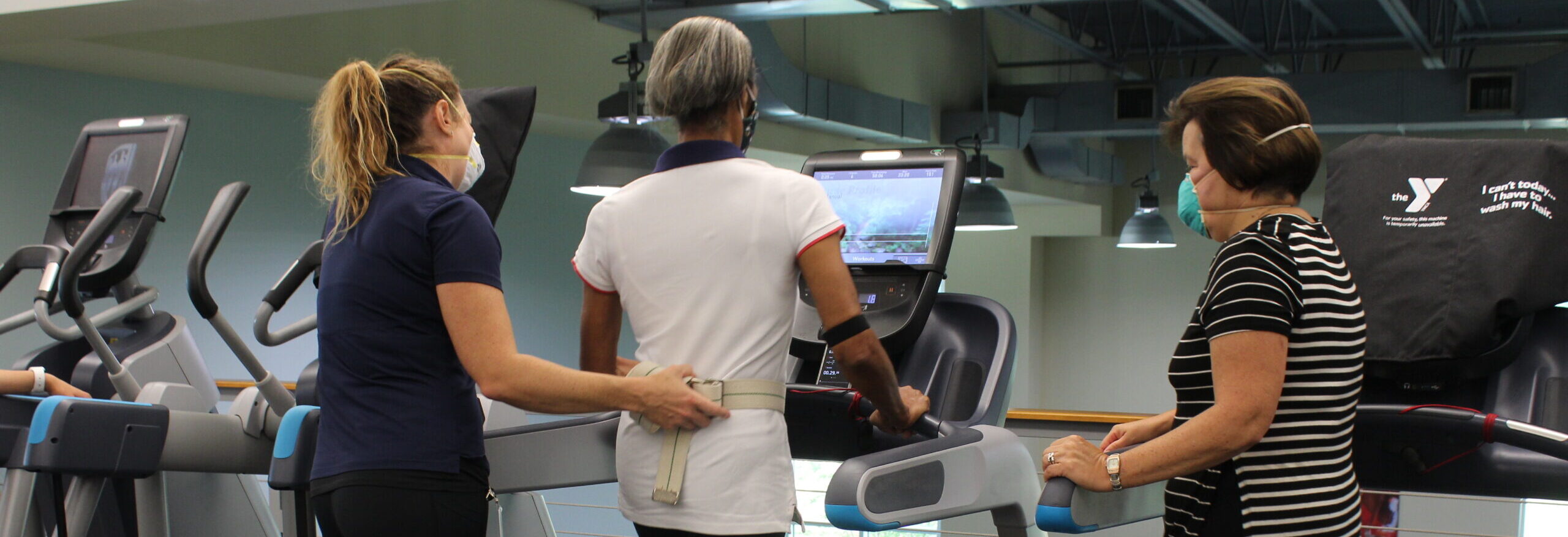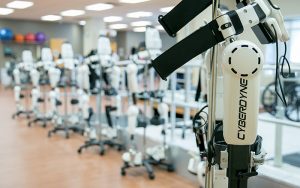Dorian Rose, PT, PhD – A Leader in Neuro Rehabilitation Research

Back to physical health resource hub
Dorian Rose, PT, PhD, is a physical therapist, Brooks clinical research scientist, a Research Health Scientist at the Malcom Randall VA Medical Center and an Associate Professor in the Department of Physical Therapy in the College of Public Health & Health Professions (PHHP) at the University of Florida (UF) in Gainesville. Though she holds many titles, one thing is for certain: she is a world-class expert in her field and a nationally recognized, award-winning researcher whose contributions to neuro rehabilitation are far-reaching.
Brooks Rehabilitation has the good fortune of having Dr. Rose as a member of the Brooks/UF–PHHP Research Collaboration, a formal research partnership between Brooks and UF. Her long-standing relationship with Brooks extends back to 2005, when she served as Site Principal Investigator for Brooks in the national, multi-site Locomotor Experience Applied Post-Stroke (LEAPS) clinical trial. One of the largest stroke rehabilitation studies ever conducted in the U.S., LEAPS compared whether individuals would achieve increased gains in their walking ability post-stroke through an innovative walking training program compared to a standard physical therapy approach focused on strengthening and balance, delivered in the home.
Since then, Dr. Rose continues to build an impressive portfolio resulting in multi-million-dollar research studies, receiving national recognition and awards from the American Physical Therapy Association (APTA) and several publications in peer-reviewed journals. Brooks Beyond magazine had the opportunity to talk with Dr. Rose:
What are some updates you can give us around your most recent research?
We’ve been studying backward walking for about eight years and learning more about the role it can play in recovery, but there are always additional questions to explore – we keep peeling the onion. In a previous study, we examined the effectiveness of a novel Backward Walking Training Program to improve walking speed and balance in acute and chronic stroke. Results from the study showed that the program sustained better improvements in walking speed and balance confidence compared to a standard balance training program.
A new area of inquiry for our research team is to examine what changes are occurring in the brain as a result of our innovative walking training programs. As a physical therapist, I believe that performing challenging tasks, and learning new motor skills can indeed change pathways in our brain. In our newest study, we are using function Magnetic Resonance Imagining (fMRI) to study the brains of our post-stroke patients and asking two questions. One, prior to implementing our backward walking study intervention, what does their brain activity look like and is that predictive of how someone will respond? And the second question is, after completing the backward walking training program, will we see changes in the brain that are related to changes in walking and balance ability?
Another area we are now studying is looking not only at patients’ post-stroke motion and mobility, but looking at their overall cardiovascular and respiratory health – and can we make a difference there? Having good respiratory and cardiovascular health can help prevent a second stroke and rehospitalizations. Years ago, we said stroke was a disease of the elderly. But sadly, the average age someone has a stroke is now lower. Now we see individuals with stroke in their thirties, forties, fifties, and they hopefully will have another 30, 40, or 50 years to live. If someone with a stroke is living another 40 years, even though they might not have perfect knee or ankle motion when they walk, we want to promote healthy heart and lungs. So, a study that we are currently conducting at the Brooks Family YMCA in Jacksonville is looking at whether we can make positive changes in respiratory and cardiovascular health. The primary motivator is this line of inquiry is keeping people healthy in the presence of disability.
What does it mean to have this type of research relationship with Brooks? How does it help drive your work?
I’m a physical therapist by trade. I worked in a large rehab center in Southwestern Pennsylvania in my scrubs or polo shirts and chinos for many years. When I go to Brooks, it’s like coming home to me. I love that atmosphere.
Often researchers are accused of working in the “ivory tower” – you don’t know what’s going on in the real world. Maybe you got a $100,000 worth of funding, but your research question doesn’t have anything to do with my 10 o’clock patient. What does it mean if I use expensive equipment or do fancy tests that maybe a scientist would be interested in, but there’s no clinical relationship?
As researchers, having a strong relationship with Brooks really keeps us grounded. I need to make sure that the questions that I might ask, or the grants that I might write, have a clinical component to them. My goal is to always design questions that can impact the care we provide our patients at Brooks. That has to always be in the forefront of my mind.
Another huge benefit is that we have the opportunity to learn from the Brooks clinicians who are seeing and treating patients every single day. It’s where the notion of backward walking post-stroke originated, for example. Hearing their concerns or the challenges their patients are struggling with motivates my ideas. I need to make sure I’m always bringing it back to the patient. That’s what’s critical.
What does it mean for a health system like Brooks to have this vibrant research component, as opposed to other health systems?
It’s a win, win – a symbiotic relationship in which the one elevates the other. Healthcare itself is more and more competitive in terms of having patients come in. Brooks can say, “Our quality of care doesn’t come from something we read about in a book that was published 10 years ago. Our care is informed by research that’s currently being conducted in-house.”
So, while this relationship elevates my research, it is even more important that patient care is elevated at Brooks. I want therapists to know they have access to me and I’m happy to consult with patients.
Brooks’ value in innovation is apparent at every level of the organization. I have clinicians and people with inquisitive minds who are interested in asking me things like, “So, you wrote this article, can we talk about what it means for this patient of mine?” It’s our vision at Brooks Research to transform rehabilitation through innovations in science, technology and care. We love seeing clinicians be forward thinking and elevating their practice, and each other, through ongoing discussions of current research and evidence-based practice.


